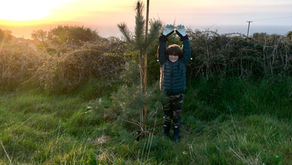
Welcome to Seaswept Farm!
Focused on increasing biodiversity, conservation and future-proof permaculture.
Small-scale regenerative farming.

Drone footage showing evolution of the farm as it moves from intensive to regenerative agriculture.
Spring 2021

What's going on: periodic updates

Forager-friendly hedging
All along the footpath we have planted forager-friendly hedging for humans and other animals. The plants have been carefully selected to ensure they are non-toxic and tasty! In a couple of years there will be an abundant supply of nuts, berries, hips and leaves - please pick sustainably!
Forager recipes
Gorse Flower Wine:
https://www.neantog.com/recipes-2/2020/4/18/gorse-flower-wine
Hawthorn Jelly:
https://www.eatweeds.co.uk/hawthorn-jelly-recipe
Seabuckthorn mousse:
https://foodal.com/knowledge/paleo/sea-buckthorn/#Recipe
Rosehip syrup:
https://www.woodlandtrust.org.uk/blog/2019/07/raw-rosehip-syrup/

Ground nesting birds
Please stick to the footpath!
Please help us to support ground-nesting birds during this critical time of year by keeping to the footpath.
We also ask dog walkers to please keep their dog on the main track, and if necessary, to use a lead, so that the birds and young chicks are not disturbed.
Ground-nesting birds can be very difficult to spot when walking across the fields and most of us would simply be unaware that they are here. In fact, the nests are so well camouflaged that to the untrained eye it is very hard to see them before you are so close that damage has already been done to them.
What constitutes disturbance, and why is it so crucial to avoid it?
An example could be a dog off a lead, simply ‘doing what dogs do’, nosing and exploring a little further off the beaten track. While this may look harmless to owners, the unfortunate effects can be to flush birds from their hidden nests and prevent them from settling for several minutes at a time, leaving eggs unattended and exposed. The cumulative impacts of this are:
Birds failing to nest or eggs failing to hatch due to chilling
Chicks dying from cold or lack of food
Nests becoming vulnerable to predators, including crows, which can be alerted by signs of a distressed parent bird alarming near its nest site due to disturbance, taking the opportunity offered to steal eggs or chicks from the unattended nest.










